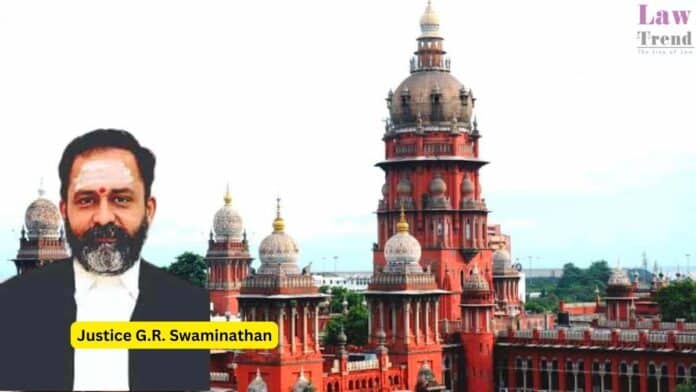In a development that has sparked intense debate within Tamil Nadu’s legal fraternity, Justice G.R. Swaminathan of the Madras High Court’s Madurai Bench has initiated suo motu contempt proceedings against a lawyer who had submitted a complaint to the Chief Justice of India, alleging caste-based bias and ideological misconduct in the judge’s courtroom conduct.
The controversy unfolded during the hearing of a routine writ appeal on July 24. While the matter had no bearing on the complaint, the Division Bench comprising Justices G.R. Swaminathan and K. Rajasekar summoned the lawyer in question and questioned whether they still stood by the allegations submitted in a 38-page representation to the CJI in June 2025.
The representation had sought an administrative inquiry through the Supreme Court’s “in-house procedure,” which was endorsed in C. Ravichandran Iyer v. Justice A.M. Bhattacharjee (1995). The complaint did not seek punitive action, only an inquiry by the CJI into the allegations.
In court, when the advocate declined to give an oral response and requested a written query, the judge directed the Registry to issue a formal questionnaire. The bench referred to past disciplinary action against the lawyer and noted that the conduct amounted to prima facie criminal contempt. The bench further stated that it had “persisted with the query” regarding the caste bias allegation and that the lawyer had refused to answer without a written order.
Appeal by Retired Judges
On July 27, eight retired judges of the Madras High Court issued a joint statement urging the sitting judges to step back from contempt proceedings. The signatories — including Justices K. Chandru, D. Hariparanthaman, and others — argued that in the absence of any action by the CJI, initiating contempt was premature.
“If and when the Chief Justice of India is of the opinion that it requires an investigation into the truthfulness or otherwise, he can constitute an ‘in-house inquiry’,” the statement read. “Only after a prima facie case is found by the committee can further action be taken.”
They also referred to the ongoing inquiry in the case of Justice Yashwant Varma of the Allahabad High Court, where the same process is being followed.
This episode has reignited questions around the use of contempt powers under Articles 129 and 215 of the Constitution. Former CJI D.Y. Chandrachud had remarked in 2023 that these powers are meant “to safeguard the functioning of courts, not to shield judges from criticism.”
Next Hearing on July 28
The court has directed the lawyer to appear again on July 28 at 1:15 PM and respond to the following written query:
“Do you stand by your imputation of caste bias on the part of Justice G.R. Swaminathan in the discharge of his judicial duties?”




